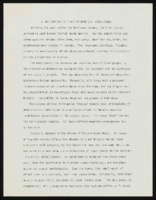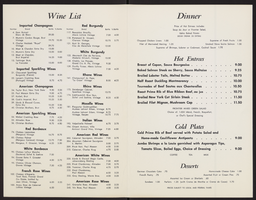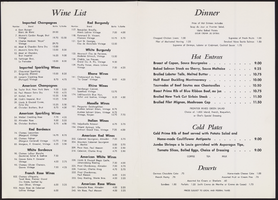Search the Special Collections and Archives Portal
Search Results
Jarbidge, Nevada Community Archives Collection
Identifier
Abstract
The Jarbidge, Nevada Community Archives Collection contains scanned images from seven archival collections and document the community of Jarbidge, Nevada from approximately 1910 to 2006. The materials were collected from various families living in Jarbidge in 2006 as part of a project led by Carrie Townley Porter. The images depict early Jarbidge structures, surrounding landscape, the Elkoro Mine, and residents of the area. Also included are images of certificates, correspondence, and newspaper articles relating to the families' histories. Also included in the collection are written summaries of ten oral history interviews of Jarbidge residents conducted in 2006. This collection contains digital surrogates only; the owners and Jarbidge Community Archives retain the originals.
Archival Collection
Florence McClure Photograph Collection
Identifier
Abstract
The Florence McClure Photograph Collection (approximately 1985-1997) consists of color photographic prints. Images show McClure and members of the Las Vegas, Nevada Community Action Against Rape (CAAR) organization that she co-founded with Sandi Petta in 1973. Also included are images of Nevada public figures and several travel images from China.
Archival Collection
Barbara Tabach Collection on the New Frontier Hotel and Casino, Las Vegas
Identifier
Abstract
The collection contains material collected by Barbara Tabach to document the final days of the New Frontier Hotel and Casino in Las Vegas, Nevada (2007). Included are brief oral history audio recordings and transcripts for approximately 50 individuals wo worked at or were customers of the New Frontier, as well as over 650 digital photographs of the people and the building. Also included is a digital video of the November 2007 implosion and a
Archival Collection
Hazel Baker Denton Papers
Identifier
Abstract
Hazel Baker Denton Papers (1907-1957) contain correspondence, family artifacts, scrapbooks, newspaper clippings, and family biographical information. Included are journals that chronicle the years Denton served as an Assemblywoman for the Nevada State Legislature and a copy of her book, Ironing Day, her newspaper columns, and speeches.
Archival Collection

"A Half Century of Black Memorabilia: 1890-1940s": manuscript draft by Roosevelt Fitzgerald
Date
Archival Collection
Description
From the Roosevelt Fitzgerald Professional Papers (MS-01082) -- Unpublished manuscripts file.
Text
Dunes Hotel Photograph Collection
Identifier
Abstract
The Dunes Hotel Photographs (1950-1993) consist of administrative, publicity and entertainment images documenting the history of the Dunes Hotel and Casino in Las Vegas, Nevada. In addition to materials focusing on day-to-day activities at the hotel (correspondence, contracts, personnel, budgets, etc.) the collection provides insight into the hotel’s entertainment and public relations activities. Although there are chronological gaps in the collection, particularly during the later years of the Dunes (1970s-1990s), it provides a significant amount of historical documentation on the famed Strip hotel that was long known to tourists and residents alike as the “the Miracle in the Desert.”
Archival Collection
Dunes Hotel and Casino Records
Identifier
Abstract
The Dunes Hotel and Casino Records are comprised of administrative, publicity, and entertainment materials documenting the history of the Dunes Hotel and Casino in Las Vegas, Nevada from the years 1954 to 1992. Included are correspondence, contracts, photographs, hotel budgets, and an early aerial photograph of the property. The material provides a significant amount of historical documentation of the hotel that was long known to tourists and residents as the "the Miracle in the Desert."
Archival Collection
Antonio Morelli Papers
Identifier
Abstract
The Antonio Morelli Papers include materials spanning from the 1910s to the 1970s that chronicle the professional and private life of longtime Sands Hotel and Casino orchestra conductor and musical director, Antonio Morelli and his wife Helen. The collection includes snapshots from Morelli's early life, three scrapbooks, one box of sound recording tapes, and a box of slides from Thailand. The collection also documents Morelli’s efforts to provide classical music concerts for the Las Vegas, Nevada community and his involvement with the Guardian Angel Church on the Las Vegas Strip.
Archival Collection


